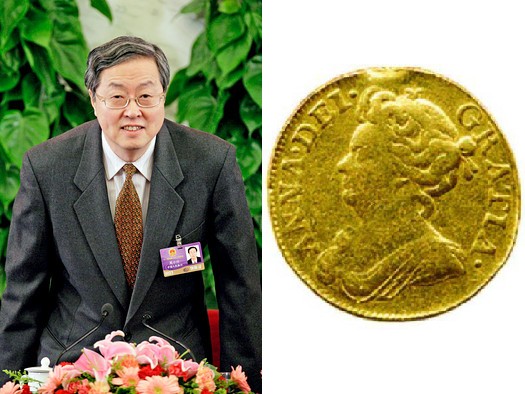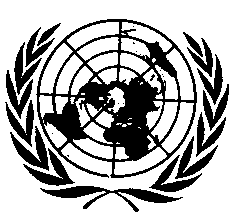 Above left is Mr Zhou Xiaochuan, Governor of China’s Central Bank. Above, right, a rare Queen Anne 1714 gold guinea coin.
Above left is Mr Zhou Xiaochuan, Governor of China’s Central Bank. Above, right, a rare Queen Anne 1714 gold guinea coin.
There is an old Chinese curse, “May you live in interesting times….”
With the historic downgrade of the US$ from AAA to AA+ and the possible collapse of the Euro – or the only VIABLE alternative to the Euro – the establishment of a fully functional Eurozone with the EU possessing SOLE competence over taxation, monetary and fiscal policy of Eurozone members, it can certainly be said that we are all living in “interesting times.”
In these “interesting times”, Mr Xiaochuan in particular is a man with some pressing concerns: Of all the nations, China possesses the largest foreign reserves. About two thirds (US $3 trillion) is in the form of US government debt. The implications of Standard & Poor’s downgrade of the US debt from AAA to AA+ are obvious as are the consequences of a fall in the value of the US $.
Mr. Xiaochuan is of course far more aware of the relative restraints imposed upon the various nations than such as Mr Ed Balls. Mr Balls in his criticism of Mr Osborne cites the USA as a fine example to follow vis-à-vis the British sovereign debt – Mr Ball’s famous “Plan B.” Of course Mr Balls fails to understand the basic difference between the £ Sterling and the US $. The status the US $ currently holds as the world’s reserve currency has given the USA an enormous advantage. It has been this status and the billions of US $ held by other governments and financial institutions around the world that has allowed the US to maintain such a profligate attitude towards “tax, borrow, print money and spend it” since 1945. Of course, apart from Mr Balls, the difference between the US $ and the GB £ is obvious to most intelligent financially literate persons.
The ratings downgrade will increase borrowing costs for the American government, companies and consumers. In addition, the credit rating agencies have said that a downgrade of government debt would probably be followed by downgrades of other entities, such as Fannie Mae and Freddie Mac, backed by the US government. By calling the outlook “negative,” S&P signalled another downgrade is possible in the next 12 to 18 months.
In the light of this, Mr. Xiaochuan has made a very important suggestion. He suggests that a new currency be created to eventually replace the US $ as the world’s reserve currency, and proposes an overhaul of global finance that reflects China’s unhappiness with the U.S. role in the world economy. Mr. Xiaochuan argues for reducing the dominance of a few individual currencies, such as the dollar, euro and yen, in international trade and finance. Most nations concentrate their assets in those reserve currencies. Mr. Xiaochuan suggests that this exaggerates the size of flows and makes financial systems overall more volatile. He suggests that in moving to a reserve currency that belongs to no individual nation would make it easier for all nations to manage their economies better, because it would give the reserve-currency nations more freedom to shift monetary policy and exchange rates.
Mr. Xiaochuan suggests the expansion of “special drawing rights,” or SDRs – an artificial currency created by the IMF in the 1960s. Its value is determined by a basket of major currencies. Originally, the SDR was intended to serve as a shared currency for international reserves, though that aspect never really got off the ground. Today, the SDR is mainly used in the IMF’s accounting for its transactions with member nations. Mr. Xiaochuan suggests that countries could increase their contributions to the IMF in exchange for greater access to a pool of reserves in SDRs. Holding more international reserves in SDRs would increase the role and powers of the IMF. China of course wants a greater say in how the IMF is run.
British Gazette comment: The British Gazette is firmly of the opinion that Mr Xiaochuan’s proposals have some merit, but would suggest that his proposed alternative to the US $ – the IMF’s Special Drawing Rights is not the answer.
Mr Xiaochuan’s proposed “solution” that involves setting a value against a basket of currencies merely transforms the problem – it does not solve the problem. The problem any reserve currency that is at the same time a national currency has is of course this: That the economic problems of the country whose currency the reserve currency is, affects those other countries who hold reserves in that reserve currency.
What Mr Xiaochuan proposes is a floating mean of a currency – that instead of being affected by the travails of the US economy, that China and other countries should volunteer to be affected by a medley of economic consequences flowing from the Eurozone economies, the USA and Japan and to a minor extent the UK.
The British Gazette would respectfully suggest to Mr. Xiaochuan that what he proposes is to exchange one mess of pottage for another mess of pottage.
This is hardly what one could call progress. Such a proposal would of course delight such as Mr Ed Balls as it would give him, or Mrs Balls, the future potential of attending meetings in foreign locations such as Washington, DC or Peking, with all the panoply such entails.
The British Gazette has a far more effective solution. One that is independent of international institutions and quangos. One that is free standing and completely market based: GOLD.
We suggest that a special meeting of the United Nations General Assembly be called to set up the United Nation’s own currency and that this currency be the Guinea. In fact we suggest that the offices could be located in the Republic of Guinea in that country’s capital, Conakry. What would be required of all UN member states, including of course the UK, would be that the Guinea would have to possess the status of LEGAL TENDER. As such no sales taxes (such as VAT) could be applied to gold held in this way. Also that there could be no exchange controls imposed on the currency – although of course financial institutions should be able to charge a conversion fee to convert the Guinea into another currency. We suggest that the Guinea could be minted in the following: a Guinea of one Troy ounce – in effect a Krugerrand. We suggest that on one side of the coin there be the UN symbol (below) and on the other side the Arabic numeral “1” and the word, “Guinea.” We suggest that smaller coins such as a “Half Guinea” and a “Quarter Guinea” be introduced being half and a quarter Troy ounce respectively.
and on the other side the Arabic numeral “1” and the word, “Guinea.” We suggest that smaller coins such as a “Half Guinea” and a “Quarter Guinea” be introduced being half and a quarter Troy ounce respectively.
It would not be necessary to have the gold coins minted in the Republic of Guinea. What we envisage is this: the overall regulation of the currency would be under the general supervision of the United Nation’s office in Conakry. This regulation would in effect be limited to the issuing of permits to mint the gold coins. Any bona fide mint anywhere in the world could apply for a license for a particular number and type of (whole/half/quarter) guinea coin. These coins of course could be minted to the order of financial institutions, corporations or even private individuals. The regulations governing the coins would relate to the fineness (purity) of the gold and to the size, weight and design of the coins.
We anticipate that large numbers of unconvertible Kugerands and their derivatives would be smelted down and re-minted as convertible guineas.
We would anticipate that the new international currency could have two languages governing the correspondence between such mints and the UN office in Conakry; English and French. English as it is the international language of finance and commerce and French as the Republic of Guinea is a Francophone country and that French has traditionally been the language of diplomacy – due of course to the large number of defeats the French have suffered at the hands of the British!
What this would mean of course would be that the Gold Standard would be re-introduced but in an international form. It would mean that financial institutions and countries who wish to hold reserves in this new currency would hold gold. It would also mean that such countries and institutions could issue interest paying bonds as long as they had these bonds backed by gold.
A new Gold Standard with gold reintroduced as a convertible hard currency (as opposed to the contrived fiction of the IMF’s SDR) would be entirely free of government policies and be subject to market forces. Such a move is likely to have the following impact upon the gold price: It will give it a (modest?) boost. More importantly, it will likely protect the current high gold price from severe downward fluctuations and would cause the gold price to fluctuate less and become a beacon of stability as investors would know that the Guinea was THE rock solid reserve currency.
Of course, the UK’s position is not helped by that idiot Gordon Brown selling off half this nation’s gold at rock bottom prices!
Speaking the Truth unto the Nation

I remember when a quarter guinea was five and thruppence, now it costs a Monkey (or is that a pony?)
History shows that the socialist governments of Australia and Belgium sold gold at the same time, and after announcing the sale to drive prices down.
The aim was to signal the end of the weights and measures system that made bullion international currency reserve, and replace it with worthless paper money.
However, because paper money is worthless, it’s merely an IOU that promises to repay the holder of a banknote, with another banknote of the same value.
It works like this: You apply for a £100,000 mortgage, and the bank shakes your hand and you sign a contract promising to repay the bank, the loan, plus interest.
However, the Bank hasn’t actually got a £100, 000 pounds to loan you, and it cannot use its depositors money, and so it creates an electronic balance of £100,000 pounds. credit in your name. It is a scam that could not work under the old gold reserve system.
Unfortunately. for the Banks, someone, somewhere, studied the Universal Commercial Code, which states that both parties to a contract must both exchange something considered to be of equal value. The lender commits themselves to repaying, a loan, that has never been made, plus interest.
The banks are unable to produce certified accounts that show they have transferred any money from them to the lender. Therefore the contract is void.
Moreover. by offering to repay the full amount allegedly owed, upon proof of contract, the banks cannot run to the courts.
By serving a time limit for the banks to produce the proofs, the lenders are, when the banks fail to comply, gaining Permanent lawful estoppel, The banks cannot pursue the matter further.
They really should have stuck with gold.
Source:http://www.larryhannigan.com/bankloan.htm